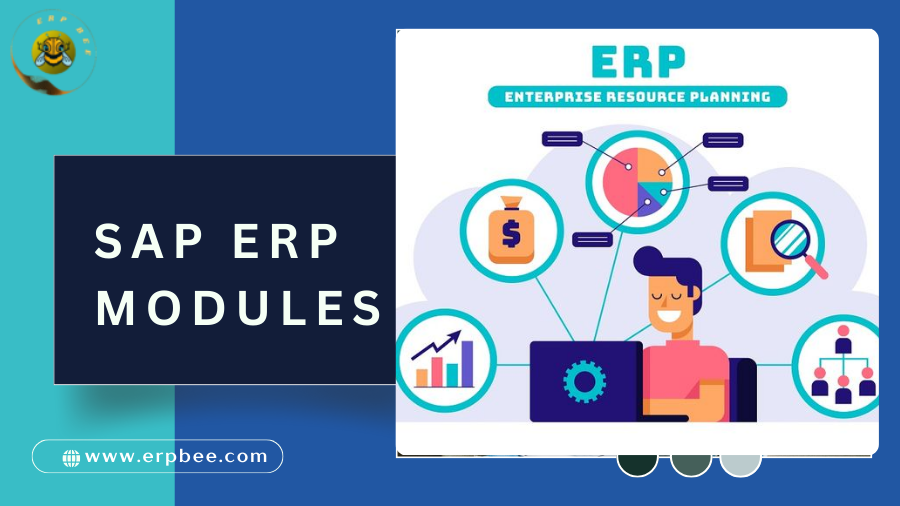Discover key SAP ERP modules from SAP FI, MM, SD, HR and more. Learn their roles, benefits, and future demand in enterprise software solutions. In today's dynamic business landscape, efficient management of resources is paramount. This is where Enterprise Resource Planning (ERP) systems come into play. SAP, a leading software provider, offers a robust ERP solution with a vast array of functional modules. But navigating this extensive collection of tools can be overwhelming. Fear not! This blog serves as your one-stop guide to understanding SAP ERP modules, empowering you to unlock their full potential and streamline your operations.
Demystifying SAP ERP A Bird's Eye View
SAP ERP functions as a central hub, integrating various business functions like finance, human resources, supply chain, and customer relationship management. Each department leverages specialized modules designed to automate tasks, improve data accuracy, and foster collaboration across the organization.
By implementing relevant SAP ERP modules, businesses can achieve
- Enhanced operational efficiency: Streamlined workflows and automated processes lead to faster turnaround times and reduced costs.
- Improved data visibility and control: Real-time data access across departments empowers informed decision-making.
- Scalability and flexibility: The modular structure allows businesses to adapt the system to their evolving needs.
- Simplified compliance: Built-in functionalities ensure adherence to industry regulations.
Unpacking the SAP ERP Module Toolbox
Now, let's delve deeper into the core SAP ERP modules, categorized for better understanding:
Financial Management
- Financial Accounting (FI): The backbone of financial management, FI handles general ledger accounting, accounts payable/receivable, and fixed assets.
- Controlling (CO): CO focuses on cost management, profitability analysis, and budgeting, providing insights for financial planning.
Human Capital Management (HCM)
- Human Resource Management (HRM): HRM simplifies tasks like recruitment, performance management, payroll processing, and employee training.
- Payroll (PY): PY ensures accurate and timely employee compensation, managing taxes and deductions.
Supply Chain Management (SCM)
- Materials Management (MM): MM handles procurement processes, inventory control, and material valuation.
- Sales and Distribution (SD): SD manages the sales cycle, from order processing to delivery and invoicing.
- Production Planning (PP): PP facilitates production planning and scheduling, ensuring efficient material usage and timely output.
- Warehouse Management (WM): WM optimizes warehouse operations, including storage, picking, packing, and shipping.
Customer Relationship Management (CRM)
- Customer Relationship Management (CRM): CRM fosters stronger customer relationships by managing sales interactions, service requests, and marketing campaigns.
Project Management
- Project System (PS): PS streamlines project planning, execution, and monitoring, ensuring on-time and within-budget project completion.
- As businesses continue to evolve, the demand for SAP ERP modules is expected to grow. Several factors contribute to this increasing demand:
- Digital Transformation: Organizations are increasingly adopting digital technologies to enhance their operations. SAP ERP modules are at the forefront of this transformation, providing the necessary tools to digitize business processes.
- Cloud Adoption: With the rise of cloud computing, more companies are migrating to cloud-based ERP solutions. SAP's cloud offerings, such as SAP S/4HANA, are gaining popularity
- Global Expansion: As businesses expand globally, they require robust ERP systems to manage complex operations across different regions. the scalability and flexibility needed to support international growth.
- Regulatory Compliance: Compliance with regulatory requirements is critical for businesses. SAP ERP modules help organizations adhere to legal standards and ensure accurate reporting, reducing the risk of non-compliance.
Future Demand for SAP ERP Modules
As businesses continue to evolve, the demand for SAP ERP modules is expected to grow. Several factors contribute to this increasing demand:
- Digital Transformation: Organizations are increasingly adopting digital technologies to enhance their operations. at the forefront of this transformation, providing the necessary tools to digitize business processes.
- Cloud Adoption: With the rise of cloud computing, more companies are migrating to cloud-based ERP solutions. SAP's cloud offerings, such as SAP S/4HANA, are gaining popularity, driving the demand for SAP ERP modules.
- Global Expansion: As businesses expand globally, they require robust ERP systems to manage complex operations across different regions. SAP ERP modules offer the scalability and flexibility needed to support international growth.
- Regulatory Compliance: Compliance with regulatory requirements is critical for businesses. SAP ERP modules help organizations adhere to legal standards and ensure accurate reporting, reducing the risk of non-compliance.
Choosing the Right SAP ERP Modules A Strategic Approach
With a multitude of modules available, selecting the ones that best align with your business goals is crucial. Here's a roadmap to guide your decision-making process:
- Identify Business Needs: Analyze your current operations and pinpoint areas requiring improvement.
- Prioritize Functionality: Evaluate which modules directly address your most pressing needs.
- Scalability Considerations: Factor in future growth plans and choose modules that can adapt to your expanding requirements.
- Integration Capabilities: Ensure the chosen modules seamlessly integrate with your existing IT infrastructure.
Conclusion
By understanding SAP ERP modules and implementing the ones that strategically align with your objectives, you can unlock a world of operational efficiency, improved data management, and a more collaborative work environment. Remember, successful SAP ERP implementation requires careful planning and expert guidance. Consider consulting with experienced SAP professionals to navigate the selection process and ensure a smooth system integration.
you may be interested in this blog here:-
Learn how to update function modules in SAP ABAP easily
Cracking the Code: Your Earning Potential as a SAP ABAP Developer with 5 Years of Experience
